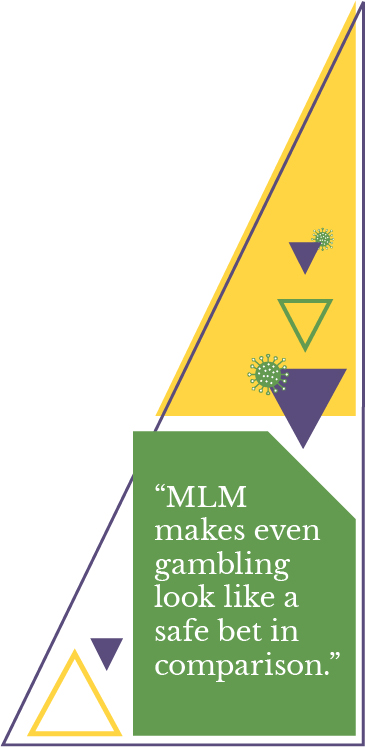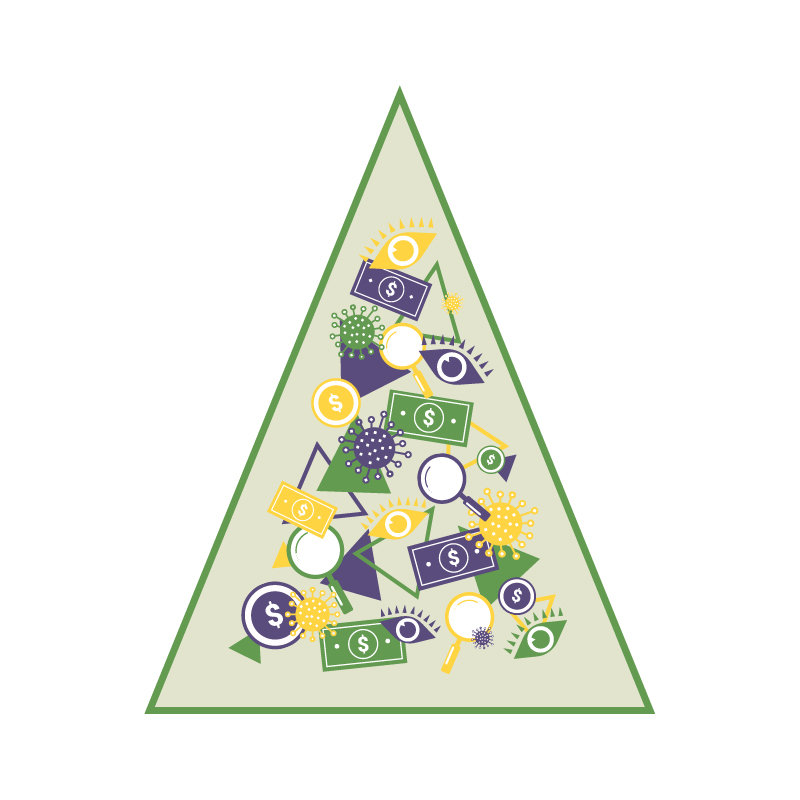The COVID crisis and the growing risk of pyramid schemes
“Are you interested in learning something new with great interest potential?” “Second guessing your career path and looking to start working online?” “Lost your job because of COVID-19 and looking to make income elsewhere?” “I’ve tripled my salary by working from home! I’d love to chat about financial freedom with you! Just DM me!”
These are common pyramid scheme and multi-level marketing (MLM) fishing tactics. I’m sure we’ve all seen it, especially with the rise of COVID-19: that one Facebook friend that makes offers of financial freedom working from home or a vivacious new health product that will beef up your immune system to defend against this deadly pandemic.
According to the Canadian government, pyramid schemes are illegal, defining them as “a form of an MLM plan focussed primarily on generating earnings through recruitment.”
“Although a small number of participants at the top of the pyramid may make money, the overwhelming majority of participants lose their money,” according to the B.C. government.
With so many people losing their jobs and being laid off, it’s no wonder that seemingly lucrative online businesses offering larger-than-life benefits and opportunities would be attractive. But many of these so-called businesses leave people even more broke and heartbroken than they were to begin with.
Though pyramid schemes are illegal in Canada, many of them are hard to detect, as they are often disguised as legal multi-level marketing plans with legitimate products to sell. An MLM is defined by the Canadian government as a business model “with three or more levels (the operator and at least two levels of participants) that promotes the supply of a product to participants of the plan.”
In her TED-Ed talk, Stacie Bosley, an economist from Hamline University in the U.S., describes the rise of Vemma Nutrition. She states that it started off as a “life-changing opportunity to earn full-time income for part-time work … There were only two steps to get started earning: purchase a $500-600 kit of their liquid nutrition products, and recruit two more members to do the same.”
This company quickly grew into a global phenomenon, bringing in thousands of new members a month, but Bosley explains that “While the company generated $200 million of annual revenue by 2013, the vast majority of participants earned less than they paid in.” Eventually, Vemma was charged with operating a pyramid scheme, but not until after they sucked their participants dry of whatever money they were willing to put into the company, thinking they would make it big and gain financial freedom.
Sarah Mills, a UFV student, shared her brief experience with a health company that she and her family suspected to be a pyramid scheme.
“I was 17 years old when I got roped into joining MonaVie. Seventeen is a very vulnerable age. You’re trying to be independent but still can be very naive. My friend and her boyfriend told me to come with them to a meeting. I thought, why not? I arrived and noticed people were all dressed up. I quickly realized it was a different kind of meeting and felt very out of place,” she said.
“Everyone seemed like they knew each other except for me. I’ve never been one to be upset about not knowing people, but this felt odd. We watched a video, and there was a speech on this new product. It was supposed to be ‘life changing’ in terms of health, and make you ‘rich’ by selling. All I had to do was buy a case and sign up. I didn’t have the money at the time to do that, so it didn’t make sense to do. But my friend quickly offered [to pay] and said it was fine as long as I helped sell them.”
Mills quickly realized that the selling of the products wasn’t as easy as it was made out to be, and came off as pushy to her friends and family. Luckily, her dad realized what was going on and warned her that she was involved in a pyramid scheme and needed to be careful.
“I was curious as to what he meant and did my own research. If I join, the people above me get money. And then I recruit others, and I make money. I didn’t like it. You’re made to feel like you’re a part of a team, but you’re not. I didn’t like that — it felt like I would be guilt-tripping my community of friends and family so someone at the top could get rich,” Mills said.
“When Mills tried to remove herself from the company, the friend that recruited her started to distance herself from Mills.
“I quickly wanted out,” Mills explained. “I didn’t like the approach used, the guilt you feel when you don’t join or participate, and what it can do to relationships. Of course, these things are not easy to get out of. I was given a case so I needed to repay that back and explain to my friend I wanted nothing to do with this. Sadly she took it as I wanted nothing to do with our friendship. It really ruined our friendship.”
MonaVie is now a defunct company, but when it was active it faced countless lawsuits, including false and misleading advertising in regards to certain health claims made by the company. The class-action lawsuit from Arkansas states that the “Defendants and their independent distributors are engaged in a conspiracy to unjustly enrich themselves to the maximum extent possible at the expense of consumers who fall victim to the false and misleading advertisements generated by Defendants and their co-conspirators. This is the Mona Vie Scheme.” They were also sued by Dr. Oz and Oprah for wrongful use of their image. A Forbes article compares the MonaView business model to that of a pyramid scheme, claiming that “The reality is that a mere 1% of Team members make any money from involvement with the firm.”
 The health and wellness industry is, arguably, one of the most popular industries for direct sales and MLM business models. This could not be more of a problem during a global health crisis. According to the Westerly Sun newspaper, officials in Connecticut are warning people about a rise in pyramid schemes during the COVID-19 health crisis.
The health and wellness industry is, arguably, one of the most popular industries for direct sales and MLM business models. This could not be more of a problem during a global health crisis. According to the Westerly Sun newspaper, officials in Connecticut are warning people about a rise in pyramid schemes during the COVID-19 health crisis.
Recruiters are working through social media to convince people to buy into their companies, promising $800 returns on a $100 investment, or more if they recruit others. Experts say this money is going straight into recruiters’ private bank accounts and that investors are unlikely to ever see a return.
“Remember that if an offer sounds too good to be true, it probably is,” Consumer Protection Commissioner Michelle H. Seagull is quoted in the Westerly Sun article. “We know that in times of hardship it can be tempting to give in to these offers, but we encourage families to take a step back, and recognize the signs of a scam. Unfortunately, in times like this scammers will try to take advantage of our fears.”
In B.C., the Better Business Bureau reported a five per cent increase in Scam Tracker reports related to COVID-19 in March and April, stating that 60 per cent of victims lost money. Karla Laird, manager for community and public relations with the B.C. Better Business Bureau, stated that the majority of scam websites were all created in the last three months and were selling items such as face masks, sanitizers, gym equipment, and fake vaccines and cures for COVID-19, amongst other things.
Quebec law enforcement has also been dealing with a rise in pyramid schemes, warning citizens that these schemes were affecting multiple regions in the province. The scammers are asking individuals to invest money and recruit others to invest as well. A CTV News article states that the Quebec law enforcement agency “reports that in some cases, scammers establish a temporary scheme to quickly pocket initial investments before disappearing. People therefore lose sometimes considerable sums of money.”
Though pyramid schemes can seem obvious to detect, that isn’t always the case. Like Mills’ involvement with MonaVie, many companies operate under the guise of a direct sales business, meaning the products are sold to you in a non-retail environment by a representative or distributor, and are not available any other way. Many companies are suspected or accused of being a pyramid scheme, but there isn’t enough evidence to legitimately accuse them of such.
One such business is the dietary company, Herbalife, which was ordered to pay $200 million in 2016 after being accused of being a pyramid scheme. They were also ordered to provide compensation to distributors who lost money. While Herbalife avoided the pyramid scheme label, they were ordered to restructure their business model, including “changes to the way the company rewards its distributors.”
Edith Ramirez, the former United States Federal Trade Commission chairwoman, is quoted in the Guardian as saying “The company promised people a dream: a chance to quit their jobs, change their lives and gain financial freedom.” The article goes on to say that instead of that, “the LA-based company paid out almost exclusively to employees who pressured other people to buy into the program at a cost of about $2,000 apiece. Herbalife enjoyed revenues from members in some of the world’s poorest countries, notably Ghana and Zambia.”
While government, law enforcement, and business monitoring agencies such as the Better Business Bureau can try to help consumers be aware of the danger of pyramid schemes and MLMs, it’s hard even for officials to detect them at times, let alone shut them down.
One of the earliest forms of MLMs came in the form of Amway, founded in 1959. The company specializes in the sale of home, beauty, and health products. They started making headlines in India after the CEO of the Amway India branch was arrested multiple times, the latest in 2018 following a complaint about financial irregularities. His arrest in 2014 was noted to be for “promoting illegal money circulation scheme, cheating and looting the gullible public with promise of get rich scheme (sic),” according to the first information report that was obtained by BW Businessworld, an Indian business magazine. Amway quickly responded that his arrest was out of line and didn’t represent their business accurately.
Indeed, it is often difficult for companies to regulate how recruiters market or advertise their products, since MLMs have a fairly detached marketing system. There really isn’t any way to ensure that proper and ethical marketing practices are being followed.
But, Amway again made headlines in China after four government agencies announced a crackdown against the company’s marketing model. According to a New York Times article, a number of former Amway recruiters organized online to share their stories and warn others, accusing the company of brainwashing them into buying products that they ultimately would not be able to sell. In fact, Liu Gang gave up a teaching job in 2009 to pursue the promise of an Amway fortune. He went as far as mortgaging his home and borrowing from illegitimate lenders to try and pursue this dream, only to be left with $600,000 of debt.
One of the company’s top distributors responded to Gang’s story by saying that the distributors were responsible for any debt they accumulated. Amway’s business practices remain legal in China, and the country is the company’s biggest market. Amway has been amping up production in Michigan to supply the Chinese market after factories in the country shut down due to the coronavirus.
In the United States in the 1970s, Amway was part of a landmark decision in which the Federal Trade Commission (FTC) distinguished an illegal pyramid scheme from an MLM. Since Amway did not require participants to purchase excessive products that were non-returnable, the FTC website explains, it did not constitute a pyramid scheme.
But Emily Kevener, who grew up in Abbotsford before briefly moving to Alberta to be with her boyfriend, sees Amway as a problem. A friend introduced her to the multi-level marketing company after she moved to a new province and was socially isolated.
“I only knew one person at the time. She introduced me to it, and I was vulnerable because I had no other group to socialize with, so I wasn’t sacrificing ‘free time;’ I was getting to interact with nice people. But in the end these people wanted to benefit from me. I believe their intentions were and are good, but I attended a couple rallies and felt it was very culty,” Kevener said.
Isolation and desperation could drive more people to fall into the lure of a promise of money and friends. In this way, the COVID-19 pandemic is a huge business opportunity for MLM recruiters. According to the United States Center for Disease Control (CDC), fear, anxiety, dread, and uncertainty are commonly felt emotions during a crisis. This increases our vulnerability, especially if there is an added factor of financial worry. This could possibly lead people to look for other opportunities, and MLMs are undoubtedly capitalizing on this fact.
But MLMs are not the answer, and certainly neither are pyramid schemes. According to a report from the Consumer Awareness Institute by Jon M. Taylor titled “The Case (for and) against Multi-level Marketing,” “less than 1% of MLM participants profit [from the business]. MLM makes even gambling look like a safe bet in comparison.”
If you’ve found yourself in the midst of a pyramid scheme, or worry that the company you’re working for may not be all that it’s promised itself to be, don’t feel bad or guilty. It often isn’t easy to tell if a company is a MLM or a pyramid scheme disguised as a legal business. So forgive yourself, move on, and be more aware in the future.
The U.S. Federal Trade Commission lists several pyramid scheme warning flags on its website, including: “Beware of any plan that offers commissions for recruiting new distributors, particularly when there is no product involved or when there is a separate, up-front membership fee. At the same time, do not assume that the presence of a purported product or service removes all danger. The Commission has seen pyramids operating behind the apparent offer of investment opportunities, charity benefits, off-shore credit cards, jewelry, women’s underwear, cosmetics, cleaning supplies, and even electricity.”
When in doubt, go with your gut. Ask questions, do research outside of the company, beware of get-rich-quick offers, and be realistic if you’re being required to sell something. Capitalism isn’t anybody’s friend (besides the one per cent), and the COVID-19 crisis is taking a mean swing at our economy, and in turn our wallets; but don’t panic and buy into a company that might seem better than it actually is. Not all that glitters is gold.
Illustrations: Anoop Dhaliwal/The Cascade

Darien Johnsen is a UFV alumni who obtained her Bachelor of Arts degree with double extended minors in Global Development Studies and Sociology in 2020. She started writing for The Cascade in 2018, taking on the role of features editor shortly after. She’s passionate about justice, sustainable development, and education.


